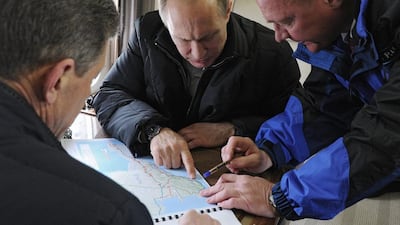For the past couple of weeks, the foreign policy cohort in Washington and other countries has been picking apart a rather long profile of Barack Obama in The Atlantic magazine.
They have been seeking to understand, through the US president’s own words, what precisely his foreign policy goals are – and whether, over the eight years of his tenure, those goals have been met.
The same attempt to understand a country’s policy through personality can be applied to Russia, whose long-serving foreign minister Sergei Lavrov recently wrote a long essay on Russia's foreign policy, looking back at it across decades and centuries. A similar exposition of the text provides a window into the mind of Vladimir Putin. For the Middle East, it does not make comforting reading.
Mr Putin has consistently outmanoeuvred Europe and the US, particularly in Syria. In his Atlantic interview, Mr Obama sought to reframe the lack of enforcement of a red line on the use of chemical weapons as a victory for diplomacy – because the weapons were subsequently removed without force. He contrasts that with Russia’s approach.
But that explanation ignores two things. It ignores: that the real policy goal of the “red line” wasn't (or should not have been) the removal of chemical weapons from the possession of the Assad regime – it was the enforcement of international norms of warfare.
Similarly with Syria. Assuming that the survival of the regime, which Russia accomplished through the use of force, was the real aim of the Russian intervention is to misplace the intention. Because Mr Putin did not go into Syria to beat the rebels – he went in to test the Europeans.
That is the key takeaway from the long essay by Mr Lavrov – Russia has been stung by two decades of isolation from global power parity since the collapse of the Soviet Union.
The country, in Mr Lavrov’s view, must reclaim its role as an indispensable European nation, one where, as he writes admiringly of the time of the 18th century tsar Peter the Great, “not a single European issue [could] be resolved without Russia's opinion”.
That is the world to which Mr Lavrov, and it can be inferred Mr Putin, wish to return.
And to do that, Moscow intends to insert itself wherever possible into political contests, whether they serve the country’s core interests or not.
For Mr Putin, the Middle East, as well as Europe’s borderlands, are one grand chessboard, across which he intends to rewrite Russia's place in the world. By politics, or through its continuation by other means, Russia intends to prove itself the equal of America and Europe, even if that means trampling over the Middle East.
Certainly, propping up the regime of Bashar Al Assad was an important calculation for Mr Putin. By doing so, he has maintained Russia’s access to its deep water port at Tartus, as well as buying allegiance and influence in Damascus for the price of 9,000 sorties.
But the real goal was to be seen as an equal to the United States, negotiating at the top table over the fate of a region in which the US has traditionally had great influence.
Mr Lavrov indeed says as much in the essay, arguing that: “A reliable solution to the problems of the modern world can only be achieved through serious and honest cooperation between the leading states.”
It is in that category that Russia wants to be seen, and the examples Mr Lavrov gives to prove that point – the Iran nuclear deal, the removal of Syria’s chemical weapons and the current ceasefire – were all achieved through negotiation with Russia.
Mr Lavrov, as indeed Mr Putin has done, continues to use the language of internationally-minded politics – law and justice, mutual interests, global terror. But the concern must be that, if and when the opportunity presents itself, Moscow will use these as justifications to act, pretexts to involve itself in conflicts that involve the West.
Syria is merely the most obvious and egregious example. (Ukraine and Georgia are others.) Russia went into Syria claiming that the threat of ISIL was a threat to the whole world. How, then, to explain Mr Putin's comments on withdrawing his troops last week that their task had been “completely fulfilled”? Since ISIL’s stronghold in Raqqa still stands, that cannot have been their primary mission.
Mr Putin sees the Middle East as merely a chessboard for his power plays. That is a shame because Russia could play a legitimate and important role in the region. But that will entail a recasting of the region in the mind of Moscow.
As long as Mr Putin sees the Middle East as a chessboard, his moves in the region will always have unhappy consequences.
falyafai@thenational.ae
On Twitter: @FaisalAlYafai


